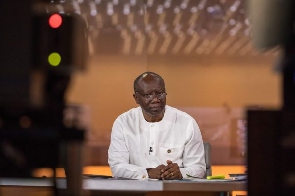Ghana’s budget deficit for 2020 will swell to more than double the legal limit because of the impact of the Coronavirus on the economy, undoing years of fiscal discipline that was supposed to mark the end of persistent financial bailouts.
The fiscal gap is forecast to widen beyond 10% of gross domestic product from an adjusted outlook in March of 7.8%, Finance Minister Ken Ofori-Atta said in an interview in the capital, Accra.
Prior to the onset of the global pandemic, the West African nation expected a shortfall of 4.7%, in line with legislation passed two years ago that the deficit shouldn’t exceed 5%.
Back to 2014
Ghana's budget deficit could surge to the widest in six years or more.
Economic growth is now projected at 1.2%, he said. That compares with a government estimate of 1.5% at the end of March and with an initial forecast of more than four times that.
“We had expected 6.8% GDP growth and now we realize there is going to be a steep drop,” said Ofori-Atta. “The deficit, which we had jealously guarded and kept under 5%, is now expected to widen north of 10%.”
The virus has brought an abrupt end to three years of GDP expansion of 6% or more and reversed some of the fiscal gains made under an International Monetary Fund program that ended in April 2019, Ghana’s 16th bailout-plan from the Washington-based lender.
Lower-than-expected oil receipts account for the biggest hit to the economy while measures to slow the spread of the virus, such as a 21-day lockdown of the biggest cities and other containment measures, are weighing on tax revenue.
The higher deficit will also push Ghana back into the cycle of missing fiscal targets in election years. The economy will be a key issue in the Dec. 7 vote when President Nana Akufo-Addo will seek to renew his mandate for another four years.
In April, the IMF approved a disbursement of about $1 billion to help Ghana address “the urgent fiscal and balance of payments needs” that the country is facing. Ghana has confirmed more than 20,000 cases and 122 deaths since its first detection of the virus on March 12.
Click to view details



Business News of Tuesday, 7 July 2020
Source: Bloomberg

















